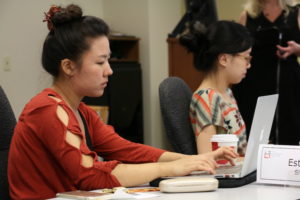NextGen Now is offered exclusively to alumni of the Getty Multicultural Undergraduate Internship Program. The format blends five days of online learning and five days of residency in a collegial environment at Claremont Graduate University in Southern California.
Tailored to meet the needs of early career professionals, the program delivers a multifaceted learning experience that includes lectures, peer conversations, self-directed reading and journaling, group problem-solving exercises, and a panel on diversity with senior-level arts executives.
The immersive experience encourages session participants to use newfound insights to approach relevant challenges in their workplace and develop a meaningful plan for success throughout their early career years.

The curriculum is rigorous, while offering time for self-reflection and practical application of materials and concepts. The online modules deliver self-learning aspects of the curriculum, such as self-assessments and primers for the residency modules. Participants will explore their individual leadership styles, issues of diversity, team dynamics, and innovations for the future. Course modules include leadership assessment and development, design thinking strategy, managing time and priorities, and team leadership. The NextGen Now program features a day on the topic of diversity with recognized arts and cultural leaders. The overall curriculum aims to develop new knowledge and skills that participants can use at their home institutions and into the future.
GLI executive education programs help museum professionals become better leaders. Program participants increase their knowledge and skills in four core areas:
- Self-Knowledge: Gain an in-depth understanding of individual leadership styles and learn how to hone strengths and maximize opportunities.
- Management Skills: Sharpen your knowledge and understanding of innovative concepts and current trends in key subject areas of Leadership Assessment and Development, Fundraising, Audience Development, Team Management, Innovation, and Strategy.
- Pragmatic Practice: Understand core strategic steps, frameworks, and measurement tools to solve complex organizational challenges and build capacity at your organization. Meet leaders in the field and explore best and new practices.
- Leadership: Understand effective leadership and develop your overall leadership skills. Create action plans to implement for your own leadership development and to effectively build your career. Assess and generate new museum thought leadership and contribute to cultural infrastructure for the field.
- Combines intellectual rigor with skillful management practices in a balanced curriculum.
- Deepens understanding by examining case-studies, applicable to museums.
- Scaffolds learning with increasingly complex ideas and theory, building from self-learning online, to immersive learning in residency, and implementation through individualized strategic challenges.
- Varies pedagogical approaches with lectures and practicums, individual and group exercises, panels and presentations, and online and classroom learning.
- Integrates technology as a learning modality, supporting green leadership and initiatives.
- Fosters change through individualized strategic challenges, which are informed by self-awareness, curriculum, coaching, and assessments.
- Provides participants with benchmarks to assess how they are moving their institutions forward.
- Challenges participants to move beyond their comfort zones, recognizing broader contexts and opportunities for personal growth.
- Empowers leadership based on individual styles, self-awareness, and authenticity rather than “one right way” of leadership.
- Creates a strong cohort of leaders and enduring professional relationships in an alumni network.
Faculty comes from top ranking institutions including the USC Marshall School of Business and the Peter F. Drucker and Masatoshi Ito Graduate School of Management at Claremont Graduate University. Faculty members incorporate museum case studies and hands-on exercises in their curricula that draw upon current events and trends, blend theory with best practices, and that are applicable to issues in the visual arts. Guest speakers include strategists, thought leaders, and executives from the museum field and Los Angeles area art museums.
See what our NextGen Now 2015 alumni had to say about the program.
